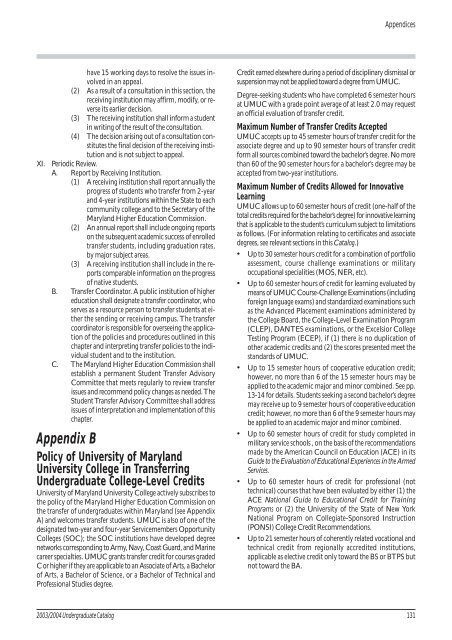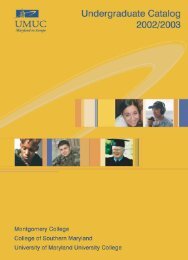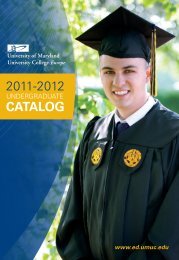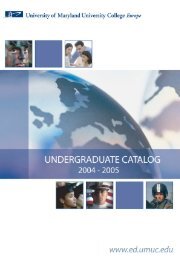Undergraduate - UMUC Europe
Undergraduate - UMUC Europe
Undergraduate - UMUC Europe
You also want an ePaper? Increase the reach of your titles
YUMPU automatically turns print PDFs into web optimized ePapers that Google loves.
have 15 working days to resolve the issues involved<br />
in an appeal.<br />
(2) As a result of a consultation in this section, the<br />
receiving institution may affirm, modify, or reverse<br />
its earlier decision.<br />
(3) The receiving institution shall inform a student<br />
in writing of the result of the consultation.<br />
(4) The decision arising out of a consultation constitutes<br />
the final decision of the receiving institution<br />
and is not subject to appeal.<br />
XI. Periodic Review.<br />
A. Report by Receiving Institution.<br />
(1) A receiving institution shall report annually the<br />
progress of students who transfer from 2-year<br />
and 4-year institutions within the State to each<br />
community college and to the Secretary of the<br />
Maryland Higher Education Commission.<br />
(2) An annual report shall include ongoing reports<br />
on the subsequent academic success of enrolled<br />
transfer students, including graduation rates,<br />
by major subject areas.<br />
(3) A receiving institution shall include in the reports<br />
comparable information on the progress<br />
of native students.<br />
B. Transfer Coordinator. A public institution of higher<br />
education shall designate a transfer coordinator, who<br />
serves as a resource person to transfer students at either<br />
the sending or receiving campus. The transfer<br />
coordinator is responsible for overseeing the application<br />
of the policies and procedures outlined in this<br />
chapter and interpreting transfer policies to the individual<br />
student and to the institution.<br />
C. The Maryland Higher Education Commission shall<br />
establish a permanent Student Transfer Advisory<br />
Committee that meets regularly to review transfer<br />
issues and recommend policy changes as needed. The<br />
Student Transfer Advisory Committee shall address<br />
issues of interpretation and implementation of this<br />
chapter.<br />
Appendix B<br />
Policy of University of Maryland<br />
University College in Transferring<br />
<strong>Undergraduate</strong> College-Level Credits<br />
University of Maryland University College actively subscribes to<br />
the policy of the Maryland Higher Education Commission on<br />
the transfer of undergraduates within Maryland (see Appendix<br />
A) and welcomes transfer students. <strong>UMUC</strong> is also of one of the<br />
designated two-year and four-year Servicemembers Opportunity<br />
Colleges (SOC); the SOC institutions have developed degree<br />
networks corresponding to Army, Navy, Coast Guard, and Marine<br />
career specialties. <strong>UMUC</strong> grants transfer credit for courses graded<br />
C or higher if they are applicable to an Associate of Arts, a Bachelor<br />
of Arts, a Bachelor of Science, or a Bachelor of Technical and<br />
Professional Studies degree.<br />
Appendices<br />
Credit earned elsewhere during a period of disciplinary dismissal or<br />
suspension may not be applied toward a degree from <strong>UMUC</strong>.<br />
Degree-seeking students who have completed 6 semester hours<br />
at <strong>UMUC</strong> with a grade point average of at least 2.0 may request<br />
an official evaluation of transfer credit.<br />
Maximum Number of Transfer Credits Accepted<br />
<strong>UMUC</strong> accepts up to 45 semester hours of transfer credit for the<br />
associate degree and up to 90 semester hours of transfer credit<br />
form all sources combined toward the bachelor’s degree. No more<br />
than 60 of the 90 semester hours for a bachelor’s degree may be<br />
accepted from two-year institutions.<br />
Maximum Number of Credits Allowed for Innovative<br />
Learning<br />
<strong>UMUC</strong> allows up to 60 semester hours of credit (one-half of the<br />
total credits required for the bachelor’s degree) for innovative learning<br />
that is applicable to the student’s curriculum subject to limitations<br />
as follows. (For information relating to certificates and associate<br />
degrees, see relevant sections in this Catalog.)<br />
Up to 30 semester hours credit for a combination of portfolio<br />
assessment, course challenge examinations or military<br />
occupational specialities (MOS, NER, etc).<br />
Up to 60 semester hours of credit for learning evaluated by<br />
means of <strong>UMUC</strong> Course-Challenge Examinations (including<br />
foreign language exams) and standardized examinations such<br />
as the Advanced Placement examinations administered by<br />
the College Board, the College-Level Examination Program<br />
(CLEP), DANTES examinations, or the Excelsior College<br />
Testing Program (ECEP), if (1) there is no duplication of<br />
other academic credits and (2) the scores presented meet the<br />
standards of <strong>UMUC</strong>.<br />
Up to 15 semester hours of cooperative education credit;<br />
however, no more than 6 of the 15 semester hours may be<br />
applied to the academic major and minor combined. See pp.<br />
13-14 for details. Students seeking a second bachelor’s degree<br />
may receive up to 9 semester hours of cooperative education<br />
credit; however, no more than 6 of the 9 semester hours may<br />
be applied to an academic major and minor combined.<br />
Up to 60 semester hours of credit for study completed in<br />
military service schools , on the basis of the recommendations<br />
made by the American Council on Education (ACE) in its<br />
Guide to the Evaluation of Educational Experiences in the Armed<br />
Services.<br />
Up to 60 semester hours of credit for professional (not<br />
technical) courses that have been evaluated by either (1) the<br />
ACE National Guide to Educational Credit for Training<br />
Programs or (2) the University of the State of New York<br />
National Program on Collegiate-Sponsored Instruction<br />
(PONSI) College Credit Recommendations.<br />
Up to 21 semester hours of coherently related vocational and<br />
technical credit from regionally accredited institutions,<br />
applicable as elective credit only toward the BS or BTPS but<br />
not toward the BA.<br />
2003/2004 <strong>Undergraduate</strong> Catalog 131






